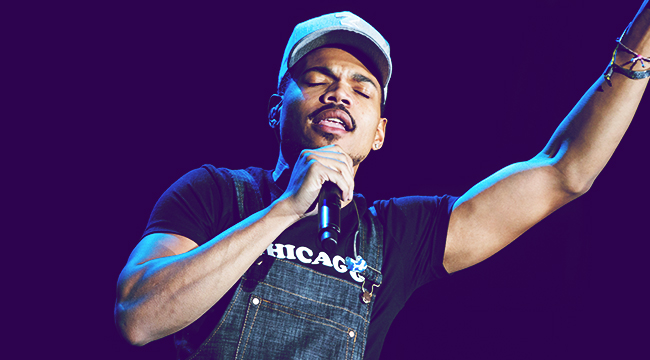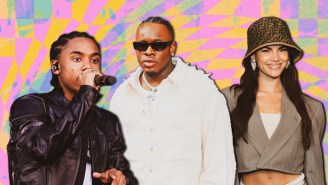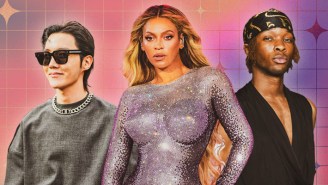
Some of the first hip-hop albums I ever owned were from Christian rappers. My then-religious mother would flip out at the content and views expressed by my other favorite hip-hop artists entering middle school, so the safest bets for me to purchase were the Parent Advisory sticker-less selections on tap at the local Christian bookstore, like Tunnel Ratz, LA Symphony, Mars iLL, and 4th Avenue Jones.
Fortunately for young me, those artists were some of the most imaginative, lyrically creative artists within hip-hop at the time. You wouldn’t know that from the way the rap audience has treated overtly religious rappers, though. The reception of “holy hip-hop” artists could best be summed up by the meme Chance The Rapper posted to his Twitter account recently — a meme for which he was promptly mocked.
It’s a variation on a popular image of two intriguingly-posed, eerily lifelike mannequins. One points at the other with its mouth wide open like it’s calling out to an unseen companion, while the other cringes. The caption is usually some variation on a mean callout used by teenagers, with the mannequins sometimes photoshopped with different accessories meant to imply pop cultural figures like anime characters — or in Chance’s case, Chance himself, through the use of his trademark “3” baseball cap.
“THIS NIGGA LOVE GOD” pic.twitter.com/5bPgyb66Ct
— Chance The Rapper (@chancetherapper) August 15, 2018
In Chance’s post, the caption reads “THIS N—- LOVE GOD,” with the cringing mannequin rocking his signature look. The implication that rap fans are generally unaccepting of overtly religious artists like Chance is unmistakeable, yet doesn’t seem entirely accurate. While his faith is a prominent aspect of his lyrical content since releasing Coloring Book to general acclaim in 2016, Chance has only grown in popularity since then, becoming a household name and a fixture on living room televisions across America with his Kit Kat campaign, colorful music video appearances, and hilariously upbeat Saturday Night Live hosting appearance last Thanksgiving weekend.
It is, however, also true that Chance’s squeaky-clean image and sunny positivity has become a sticking point for his detractors, many of whom have expressed a general preference for grittier, seemingly more grounded set of artists along the lines of Kendrick Lamar and ’90s-steeped artists like Nas, Jay-Z, Pusha T, and other, more stoic, traditionally masculine rappers. The irony of their complaints is that many of these rappers also openly rap about their religious beliefs; Kendrick Lamar especially tends to explore his faith, his doubts, and and his contemplation of religion on songs like “His Pain II,” “How Much A Dollar Cost,” and “Duckworth,” to say nothing of the more overtly-named “Faith” and “God.”
In fact, rap has long had a tradition of quoting scripture and openly questioning religious mores, going back to some of its earliest records. “The Message” referenced God as a constant companion through the ups and downs of life. The refrain of “only God can judge me” is echoed throughout hip-hop, while Tupac wondered if Heaven has a ghetto. Kanye West rapped “Jesus Walks” with him before proclaiming “I Am A God.” P. Diddy and DMX quoted Bible verses on songs that otherwise dabbled in every sin imaginable. Jesus pieces adorn the necks of some of rap’s most prominent gangster figures, Clipse regularly requested forgiveness for their illicit activities, and rappers like Mos Def and Talib Kweli shared their Muslim views throughout their catalogs.
Yet there is some blockage within hip-hop that prevents the community at large from seriously engaging with an artist like Lecrae, who just recently put out a full project in collaboration with Zaytoven, one of the pioneers of the trap sound. On Let The Trap Say Amen, the classically-trained producer puts his church bandleader background on display, bringing his gospel-infused piano work full circle to provide colorful backdrops for Lecrae to address life in the “traps” of his native Atlanta. He told DJ Booth his motivation for crafting an overtly Christian-leaning trap album was to expand the understanding of what life is like in the inner city; yes, there is hopelessness and crime, but many find the church somewhere they can replenish that hope.
“When you hear the term “trap music” you most likely think of an ode to drugs, dealing, money, and mayhem,” he said. “But truthfully, the production sets the scene first. Dope boys want to rap over a particular soundscape. Zaytoven, Metro Boomin, and Murda Beatz, amongst others, provide that. There was a trap beat before anyone glorified trap life over it and there are more stories from the Trap that have yet to be told. Kendrick’s done it, Kodak Black spilled his heart out, my brother Thi’sl from St. Louis has as well. The trap does more than say ‘Aye.’ It says “Amen.”
In his way, Chance The Rapper has done much the same. He uses spiritual uplift to relay gratitude at overcoming a burgeoning drug addiction, to reflect on his growth as an artist and represent his hometown of Chicago in a more positive light that it may be denied by mainstream news coverage, and to encourage his listeners to keep the faith and keep up the fight.
In Chance’s music, faith, religion, and God are constants, a way to reflect on the world around him and bask in the blessings he’s received, both spiritual and material, as a result of his zealous pursuit of his independent rap dream. His meme reflects his sense that this makes him a target of ridicule, but he also is quick to point out the approval of other fans when it counts, singing on DJ Khaled’s “No Brainer” “She told me that she love that I make music for God.”
https://twitter.com/SaviorOfTheEast/status/1029818556404432896
In the end, the criticism that Chance has received is likely less due to his religious views and more because of his stylistic switch up from the music he made on Acid Rap. While fickle fans often insist that rappers display some sort musical evolution from project to project, they are just as likely to deride a new direction, especially if it departs heavily from the expected trajectory fans project on their favorite artists. While many fans will take issue with Chance’s musical choices on and since Coloring Book, there’s really very little for him to be ashamed of as he continues to represent the heights of independent success.
However, the chilly reception for Lecrae and other openly Christian rappers demonstrates that rap does have a resistance to a certain kind of religious content. While the Kendricks and Chances of the hip-hop world have been free to interrogate their faith through their work, there’s a whole subset of artists who see a steep decline in interest once their beliefs are stated, from more recent devotees like No Malice (formerly of Clipse) and MC Jin, to rappers who come out the gate with a foregrounded religious message like Lecrae, NF, Propaganda, Da TRUTH, Bizzle, Trip Lee, and so many others.
Rap fans just don’t seem ready to accept this branch of the genre, although to be fair, many of the artists mentioned just don’t seem to make the type of music that follows rap’s generally more melodic modern direction. It turns out Chance’s meme wasn’t completely off the mark, he just picked the wrong target. Unfortunately, that just means that by never giving alternative artists a chance, rap’s fans are the ones who might be missing out.






